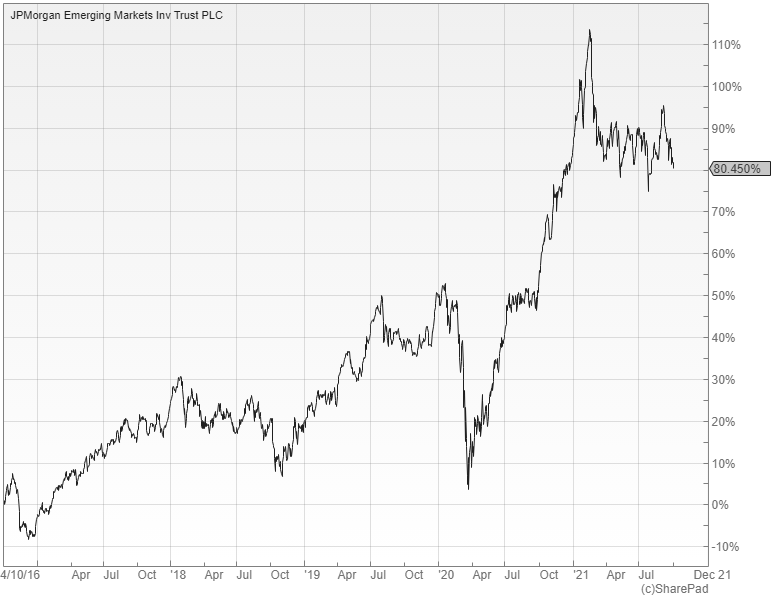A spectacular year for JPMorgan Emerging Markets

JPMorgan Emerging Markets (LON: JMG) has just released its annual results for the year to the end of June, which show an impressive NAV total return of 32.7%, comfortably ahead of the 26% achieved by its MSCI EM benchmark. Manager Austin Forey has been in place since 1994 and over the last decade has generated an annualised return of 11.1% versus 7.6% for the index.
Forey uses a purely bottom-up approach that targets quality growth companies with a sustainable competitive advantage and strong cash generation. He says that the emerging markets are following a similar pattern to their developed counterparts with digitalisation, internet-based business models and the creation of intangible value all establishing themselves as key themes.
Because of this the portfolio tends to be weighted in favour of particular countries and sectors such as IT services, e-commerce, technology hardware, financials and consumer brands. Unlike some of its peers there is no exposure to capital intensive industries like basic commodities, real estate, utilities or heavy industry, where the returns on capital tend to be lower.
Return drivers
At the end of August the largest country allocations relative to the index were Argentina, India, Belarus and Singapore, while the key underweights were South Korea, Brazil and China, although the latter still represented almost a third of the fund. The top ten holdings included: Taiwan Semiconductor; EPAM, which operates in the IT services sector; the Chinese internet company Tencent; and Mercado Libre, an e-commerce company in Argentina.
The trust’s outperformance has largely been driven by strong stock selection with the main contributions in the last five years coming from markets in Europe, the Middle East, Africa and Latin America. Some of the key contributors were the Eastern European software services company EPAM, as well as Mercado Libre and the IT and software company Globant.
Chinese internet stocks like Tencent and Alibaba, another top ten holding, have sold off hard in the last seven months due to the interventionist policy being followed by the communist party. This has contributed to the 1.2% decline in NAV since the end of June, however the benchmark is down 5.5% over the same period.
Chinese puzzle
Forey says that China leans instinctively towards intervention and control, which leads to uncertainty for investors and this needs to be priced in. He thinks that returns from the country are likely to be lower going forwards, although it remains an important market to invest in.
Most of the strong returns in the reporting period were generated during 2020 as global markets recovered from the pandemic, but 2021 has been a lot more challenging. Since the first of the Chinese communist party interventions early in the year the shares are down around 16% and are currently available on a wider than normal discount to NAV of nine percent.
Forey has built up an excellent long-track record, however the interventions in China and the cyclical shift in favour of value stocks have provided significant headwinds in recent months. If you are thinking of investing you would need to take a view on these two key issues, although it is worth noting that the broker Numis still regard JMG as their core recommendation for a diversified exposure to the region.

Comments (0)